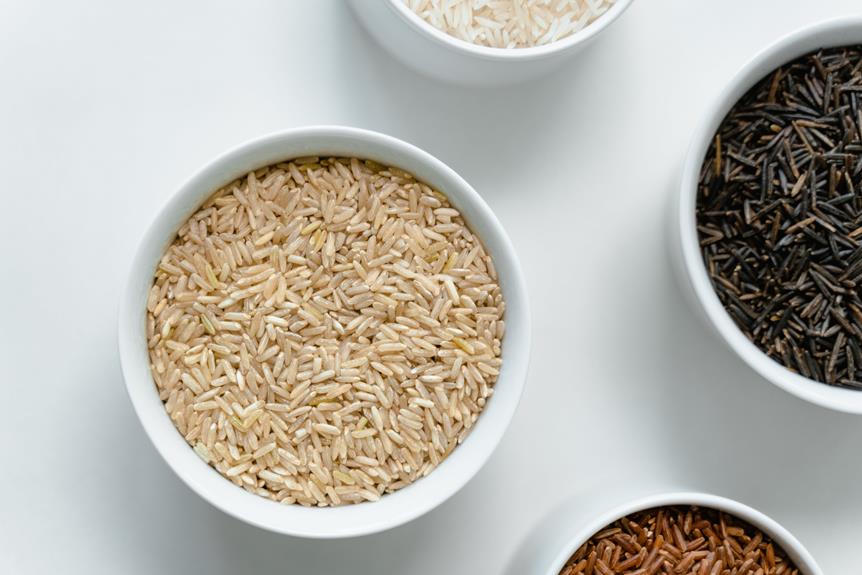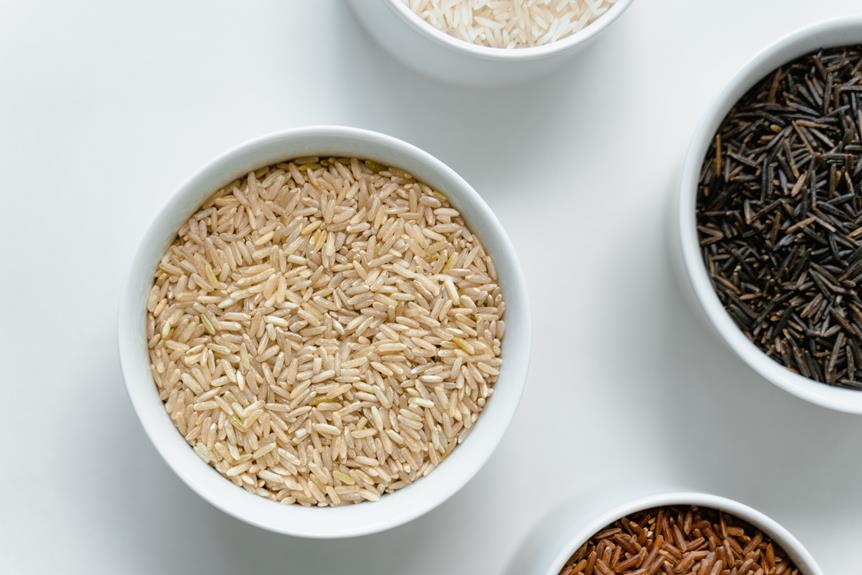Imagine your gut as a bustling city, with trillions of bacteria working tirelessly to keep things running smoothly. Now, picture dietary fiber as the essential fuel that keeps this city thriving and its residents happy. But why is dietary fiber so crucial for the health of these hardworking gut bacteria? Well, buckle up, because in the next few paragraphs, we will uncover the fascinating connection between dietary fiber and gut bacteria, and why it is vital for your overall well-being.
Key Takeaways
- Dietary fiber is essential for maintaining a healthy gut and regulating bowel movements.
- It acts as a prebiotic, nourishing beneficial gut bacteria and increasing bacterial diversity.
- Fiber supports gut barrier function, produces beneficial metabolites, and improves digestion and immune function.
- Overall, dietary fiber promotes a balanced gut microbiota and supports the growth of beneficial bacteria.
Importance of Dietary Fiber for Gut Health
Dietary fiber plays a crucial role in maintaining a healthy gut. It is essential for supporting the overall health of your digestive system. When you consume enough fiber, it helps to regulate your bowel movements and prevent constipation. Fiber adds bulk to your stool, making it easier to pass through your intestines. This not only prevents discomfort but also reduces the risk of developing conditions like hemorrhoids and diverticulosis.
Moreover, dietary fiber aids in improving the health of your gut by acting as a prebiotic. Prebiotics are non-digestible carbohydrates that provide nourishment to the beneficial bacteria in your gut. These bacteria, known as probiotics, play a vital role in maintaining a balanced gut microbiome. They help in breaking down indigestible fiber and produce short-chain fatty acids, which nourish the cells lining your colon and promote a healthy gut environment.
In addition, dietary fiber can help regulate blood sugar levels. Soluble fiber, found in foods like oats, legumes, and fruits, can slow down the absorption of sugar into your bloodstream. This can be particularly beneficial for individuals with diabetes or those at risk of developing the condition. By helping to control blood sugar levels, fiber also contributes to weight management and reduces the risk of obesity, which is a known risk factor for various digestive disorders.
To reap the benefits of dietary fiber for your gut health, it is recommended to include a variety of fiber-rich foods in your diet. These include whole grains, fruits, vegetables, legumes, nuts, and seeds. Aim for at least 25-30 grams of fiber per day for optimal gut health.
How Dietary Fiber Supports Beneficial Gut Bacteria
Consuming an adequate amount of fiber-rich foods is essential for nurturing the growth and diversity of beneficial gut bacteria. Here's how dietary fiber supports these helpful microorganisms:
- Provides nourishment: Beneficial gut bacteria thrive on dietary fiber, as it serves as their main source of nourishment. Unlike other nutrients, fiber is not broken down during digestion, but instead, it travels to the colon where it is fermented by gut bacteria. This fermentation process produces short-chain fatty acids (SCFAs), such as butyrate, acetate, and propionate, which provide energy for the cells lining the colon and promote a healthy gut environment.
- Increases bacterial diversity: Fiber acts as a prebiotic, which means it provides food and fosters the growth of beneficial gut bacteria. By consuming a variety of fiber-rich foods, you can support a diverse range of bacterial species in your gut. A diverse gut microbiota is associated with better overall health and a lower risk of various diseases, including obesity, diabetes, and inflammatory bowel disease.
- Enhances gut barrier function: Dietary fiber plays a crucial role in maintaining the integrity of the gut barrier. This barrier prevents harmful substances and pathogens from entering the bloodstream while allowing beneficial nutrients to be absorbed. Fiber promotes the production of mucus in the gut, which acts as a protective layer and helps regulate the passage of substances through the gut lining. A healthy gut barrier is essential for optimal gut health and overall well-being.
Relationship Between Dietary Fiber and Digestion
To understand the relationship between dietary fiber and digestion, it's important to recognize how fiber interacts with the digestive system. When you consume dietary fiber, it passes through the stomach and small intestine relatively intact because your body lacks the necessary enzymes to break it down. As it reaches the large intestine, fiber begins to ferment, providing a food source for the beneficial bacteria that reside there.
The fermentation process of dietary fiber produces short-chain fatty acids (SCFAs), such as butyrate, acetate, and propionate. These SCFAs play a crucial role in maintaining the health of your digestive system. Butyrate, for example, is the primary energy source for the cells lining the colon. It helps to reduce inflammation, improve gut barrier function, and regulate the growth and differentiation of intestinal cells.
In addition to producing SCFAs, fiber also increases the bulkiness and softness of stool, making it easier to pass through the digestive tract. This helps to prevent constipation and promotes regular bowel movements.
By promoting bulk and softness, dietary fiber can also help regulate blood sugar levels. It slows down the absorption of glucose, preventing spikes in blood sugar after a meal. This is particularly beneficial for individuals with diabetes or those at risk of developing the condition.
Furthermore, fiber has been shown to increase satiety and promote weight management. Since it takes longer to digest, high-fiber foods help you feel fuller for longer, reducing the likelihood of overeating.
Impact of Dietary Fiber on Gut Microbiota
As you consider the impact of dietary fiber on gut microbiota, it becomes evident that the presence of fiber in your diet plays a crucial role in shaping the community of bacteria residing in your gut. Here are three ways in which dietary fiber influences your gut microbiota:
- Nourishment for beneficial bacteria: Dietary fiber serves as a source of nourishment for the beneficial bacteria in your gut. These bacteria break down the fiber into short-chain fatty acids (SCFAs), such as butyrate, acetate, and propionate. SCFAs provide energy to the cells lining your colon, help maintain the integrity of the gut lining, and promote a healthy gut environment.
- Increased microbial diversity: Consuming a fiber-rich diet can increase the diversity of gut bacteria. Different types of fiber support the growth of various bacterial species, leading to a more diverse and robust gut microbiota. A diverse gut microbiota is associated with better overall health, including improved digestion, enhanced immune function, and reduced risk of certain diseases.
- Production of beneficial metabolites: The fermentation of dietary fiber by gut bacteria produces metabolites that have numerous health benefits. For instance, SCFAs not only nourish the gut cells but also have anti-inflammatory properties, help regulate appetite, and support weight management. Additionally, fiber fermentation produces gases like hydrogen and methane, which can stimulate bowel movements and help prevent constipation.
Role of Dietary Fiber in Promoting Overall Gut Health
Dietary fiber plays a vital role in promoting overall gut health by supporting the growth of beneficial bacteria and providing essential nutrients for the cells lining the gut. When you consume fiber-rich foods, such as fruits, vegetables, whole grains, and legumes, you are providing your gut with the necessary fuel to maintain a healthy environment.
One of the key ways that dietary fiber promotes gut health is by acting as a prebiotic. Prebiotics are substances that nourish and stimulate the growth of beneficial bacteria in the gut. These bacteria, known as probiotics, play a crucial role in maintaining a balanced microbiota and supporting various aspects of your health, including digestion, immunity, and even mental well-being.
To give you a clearer picture, here is a table that highlights the benefits of dietary fiber for overall gut health:
| Benefits of Dietary Fiber for Gut Health |
|---|
| Supports the growth of beneficial bacteria |
| Stimulates the production of short-chain fatty acids |
| Enhances the integrity of the gut barrier |
| Regulates bowel movements and prevents constipation |
By supporting the growth of beneficial bacteria, dietary fiber helps create an environment that is conducive to a healthy gut. Additionally, fiber is fermented by these bacteria, leading to the production of short-chain fatty acids, which provide energy for the cells lining the gut and have anti-inflammatory effects.
Moreover, dietary fiber helps maintain the integrity of the gut barrier, preventing harmful substances from entering the bloodstream. It also regulates bowel movements, preventing constipation and promoting regularity.
Incorporating fiber-rich foods into your diet is essential for promoting overall gut health. By doing so, you are providing your gut with the necessary nutrients and support it needs to function optimally. So, make sure to include a variety of fruits, vegetables, whole grains, and legumes in your meals to keep your gut healthy and happy.
Frequently Asked Questions
How Much Dietary Fiber Should I Consume Daily to Support Gut Bacteria?
To support gut bacteria, you should consume a sufficient amount of dietary fiber daily. Dietary fibers are essential for maintaining a healthy gut microbiome. They act as a food source for beneficial bacteria in your gut, promoting their growth and diversity. While the exact recommended amount may vary based on individual needs, experts generally suggest aiming for around 25-38 grams of fiber per day. This can be achieved by including a variety of fiber-rich foods in your diet, such as fruits, vegetables, whole grains, and legumes.
Can I Get Enough Dietary Fiber From Supplements Instead of Food Sources?
You can get some dietary fiber from supplements, but it's best to focus on food sources. While supplements can provide some fiber, they often lack the other essential nutrients found in whole foods. Eating a variety of fruits, vegetables, whole grains, and legumes is the ideal way to ensure you're getting enough fiber to support your gut bacteria. These natural sources of fiber also offer additional health benefits that supplements may not provide.
Does the Type of Dietary Fiber I Consume Make a Difference in Promoting Gut Health?
Yes, the type of dietary fiber you consume does make a difference in promoting gut health. Different types of fiber have different effects on the gut bacteria. Soluble fiber, found in foods like oats and legumes, forms a gel-like substance in the gut and helps regulate blood sugar levels. Insoluble fiber, found in foods like whole grains and vegetables, adds bulk to the stool and promotes regular bowel movements. Both types of fiber are important for maintaining a healthy gut microbiome.
Are There Any Risks or Side Effects Associated With Consuming Too Much Dietary Fiber?
Consuming excessive dietary fiber can lead to certain risks and side effects. These can include bloating, gas, and abdominal discomfort. It is important to note that everyone's tolerance for fiber differs, so it's essential to listen to your body and adjust your intake accordingly. Additionally, consuming too much fiber without adequate hydration can result in constipation. It is recommended to gradually increase your fiber intake and drink plenty of water to minimize any potential side effects.
Can Dietary Fiber Help With Specific Gut-Related Conditions Such as Irritable Bowel Syndrome (Ibs) or Inflammatory Bowel Disease (Ibd)?
Dietary fiber can indeed help with specific gut-related conditions like Irritable Bowel Syndrome (IBS) or Inflammatory Bowel Disease (IBD). It can provide relief from symptoms such as bloating, constipation, and diarrhea. By adding fiber-rich foods to your diet, you can improve your gut health and promote regular bowel movements. However, it's important to consult with a healthcare professional to determine the right amount of fiber for your specific condition, as consuming too much fiber can worsen symptoms in some cases.



